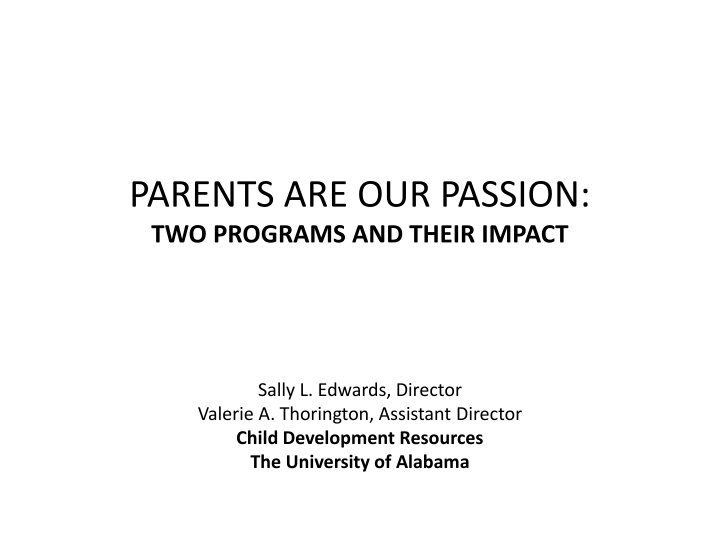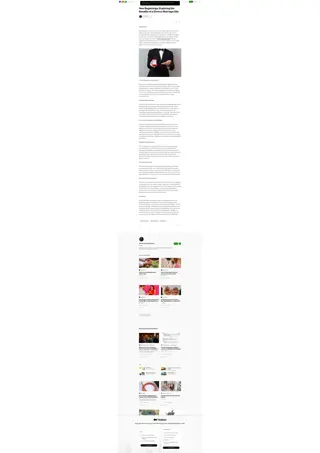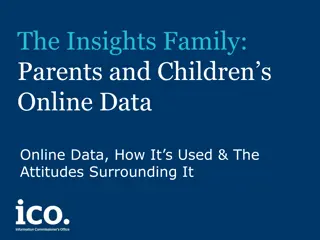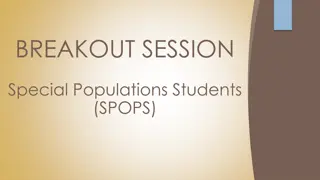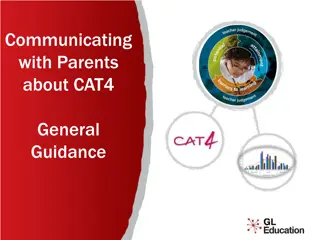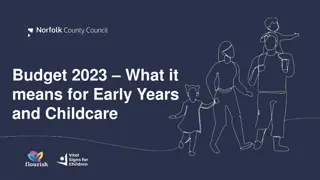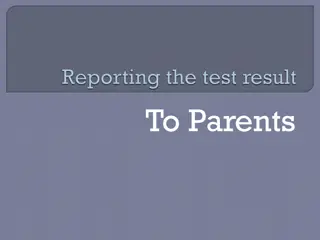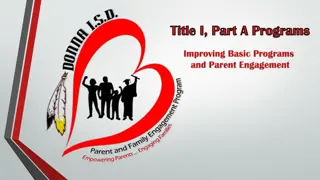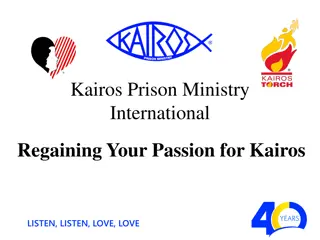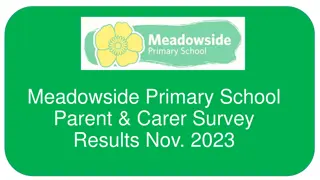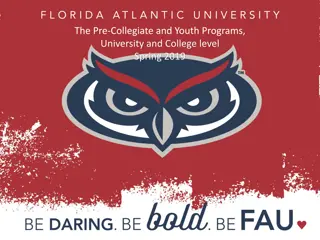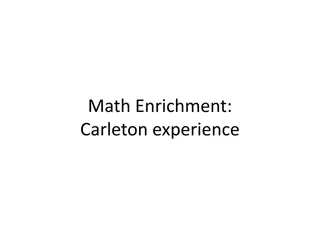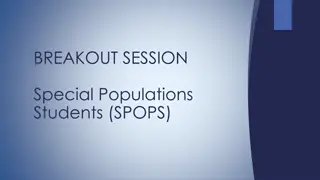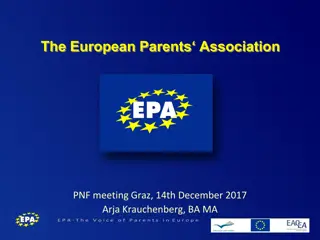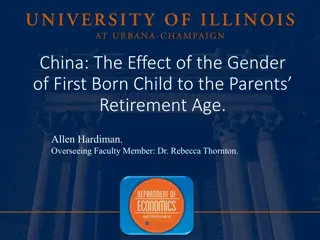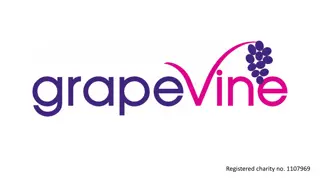PARENTS ARE OUR PASSION: TWO PROGRAMS AND THEIR IMPACT
A community service initiative at The University of Alabama, Child Development Resources (CDR) focuses on providing resources for parents and child care providers. Established in 1993, CDR offers child care resource and referral services, manages child care subsidy programs, and provides quality enhancement services. Guided by the National Strengthening Families Approach, CDR emphasizes building family strengths, promoting optimal development, and reducing child abuse and neglect through protective factors such as parental resilience and social connections.
Download Presentation

Please find below an Image/Link to download the presentation.
The content on the website is provided AS IS for your information and personal use only. It may not be sold, licensed, or shared on other websites without obtaining consent from the author.If you encounter any issues during the download, it is possible that the publisher has removed the file from their server.
You are allowed to download the files provided on this website for personal or commercial use, subject to the condition that they are used lawfully. All files are the property of their respective owners.
The content on the website is provided AS IS for your information and personal use only. It may not be sold, licensed, or shared on other websites without obtaining consent from the author.
E N D
Presentation Transcript
PARENTS ARE OUR PASSION: TWO PROGRAMS AND THEIR IMPACT Sally L. Edwards, Director Valerie A. Thorington, Assistant Director Child Development Resources The University of Alabama
A community service initiative of the College of Human Environmental Sciences at The University of Alabama
How We Started CCDBG Funding established by Congress in 1990 created new opportunities for states Alabama, through the lead agency, the Department of Human Resources, made a progressive decision to develop Child Care Management Agencies --- grassroots organizations embedded in local communities.
Child Development Resources CDR is unique in that most entities doing this work in Alabama and indeed in other parts of the country are free standing non-profits Exceptional support from our Dean and UA administration who had a sense, even in the early 90s, of the impact and value of community engagement and how it could occur in a University setting
Child Development Resources (CDR) started in 1993, serving a multi-county area in west- central Alabama, with two primary purposes: To develop relationships with parents and child care providers in order to provide child care resource and referral and to manage the child care subsidy program To provide quality enhancement services to child care providers All of the work at Child Development Resources is relationship oriented and strength based
Philosophical Framework The National Strengthening Families Approach* seeks to mobilize partners communities and families to build family strengths promote optional development and reduce child abuse and neglect *Center For The Study Of Law and Social Policy; Atlanta, Ga
Protective Factors The following Protective Factors promote healthy outcomes, are key components of the Strengthening Families Approach, and are embedded throughout all CDR programming: Parental resilience Social connections Knowledge of parenting and child development Concrete support in times of need Social and emotional competence of children
Touchpoints Model Based in the work of Dr. T. Berry Brazelton, noted pediatrician and researcher at Harvard Medical School. Provides skills and strategies with which practitioners can build alliances with parents of children age birth to three Touchpoints are predictable times and events in development when a child s behavior seems to fall apart and are often accompanied by parental frustration and self-doubt; these times are key opportunities for practitioners to come alongside to offer support and guidance Operates from a set of Parent Assumptions and the Principles of Touchpoints Practice
Baby TALK In 2000, the CDR made the decision to bring the Baby TALK model to Tuscaloosa. Baby TALK (Teaching Activities for Learning and Knowledge) is a community effort designed to encourage parents in the nurture of their small children ages birth to three years. New parents are provided with basic child development information and suggestions for developmentally appropriate activities.
A board book is given to parents to read aloud to their children, believing that reading aloud, more than any other single activity, will enhance the parent/child relationship as it encourages the child s mental, social, and language development. Language, Literature and Love
Baby TALK Rationale and Goals Encourage parents in establishing a nurturing relationship with their children and to reinforce positive parenting practices Share developmental information to parents in a timely and usable fashion in order to help them understand child behaviors Suggest developmentally appropriate activities for parents to enjoy with their children in order to enhance the child s development as well as the parent-child relationship
Service Delivery Model Baby TALK is dedicated to a service delivery model which is: readily accessible for families allows parents to receive services meaningful for their needs rather than imposing an agenda which may not be as helpful to them includes efforts to go where parents are already: to health care providers, to human service agencies, to neighborhoods, and to homes
Components Hospital Visits Baby TALK Times Family Fun Events Well Child / WIC Clinics Prenatal Clinics Developmental Newsletters Supports Parenting Classes for Teen Parents Warm Line
Baby TALK Data Over 28,000 Baby TALK visits to new parents at two local hospitals Over 850 parents and children participated in 22, eight week sessions of Baby TALK Times 93 Family Fun Night Events involved more than 1000 participants from 314 families Over 51,000 visits to well-child clinic settings Over 700 prenatal clinic visits at a local health care facility serving at risk families Over 180,000 development newsletters have been mailed to families Of the contacts with children at the various Baby TALK sites 47.0% were birth to 1 year 22.8% were 1 to 3 years 16.9% were 3 to 5 years 6.2% were 5 years to 7 years 6% were 7 years and older
Parent Information Of the 20,000 Parent Information Forms received 18,517 parents shared marital and employment information: 52% married 40% never married 5% divorced 2% separated < 1% widowed 38% employed full time 15.2% employed part time 35.8% not employed and not seeking employment 10.8% unemployed and seeking employment
Baby TALK Collaborations 272 volunteers have assisted with Baby TALK Baby TALK collaborations have included: The Children s Trust Fund of Alabama Junior League United Way Early Intervention Community Foundation Tuscaloosa s One Place: A Family Resource Center Exchange Club Foundation Target Corporation Dollar General Corporation City and County Schools University of Alabama Greek Organizations Catholic Family Services Alabama Career Center System Alabama Civil Justice Foundation Children s Hands on Museum Local Civic Organizations Baby TALK sites: County Health Departments, Local Hospitals, Health Clinics, Early Head Start
PAL Alabamas Parenting Assistance Line PAL s inception began with Mrs. Patsy Riley, Alabama s Former First former First Lady, whose vision was was to provide parents the support they need to become more confident and successful in their role as parents. The Parenting Assistance Line was launched in March 2007 to provide free information, support, and tools to parents and families across the state of Alabama
PAL Collaborations Have Included: The University of Alabama The Children s Trust Fund of Alabama Alabama Department of Human Resources Alabama Department of Mental Health The Office of Alabama s First Lady Wal-Mart Corporation
PAL has been fully operational for over five years Over 12,000 calls have been received Calls have been received from virtually every county in Alabama as well as 35 other states and Canada
PAL is Free Confidential Anonymous Available Monday through Friday 8 am to 8 pm
Calling PAL When parents call the toll-free number they reach a Parent Resource Specialist who holds an undergraduate or graduate degree in Human Development and Family Studies (or closely related field) and has received additional specialized training.
Because parents often call PAL when they are under great stress, frustrated or angry, Parent Resource Specialists practice: Active listening Validation Concern Compassion Sometimes parents just need to know they are Sometimes parents just need to know they are heard heard
Calls range from typical parenting issues: toilet training sleeping feeding school-related issues back-talk TO . . . . . .
More serious situations: children with disabilities serious behavioral disorders alcohol/ drug issues cutting pregnant teens children from abusive situations
PAL operates from the belief that families benefit when parents understand Their child s development The skills needed for effective parenting
When they have the opportunity to talk through their specific parenting situation or concern, parents feel Less Stressed More capable and confident Better able to cope Parents can talk it out not take it out on their children. Parents can talk it out not take it out on their children.
What We Know About PAL Calls The vast majority of calls have been from Moms who have discussed parent support / parental stress issues. PAL also receives calls from: Grandparents Other Family Members Fathers Professionals
Highest percentage of calls relate to preschoolers (3-6 years) and schoolagers (6-12 years) Most calls are received . . . Mondays & Wednesdays 10 AM noon & 2 PM 4 PM Some escalation in May, June and August
56% of callers heard about PAL from family members, friends, professionals or the internet Over 37% of callers heard about PAL through TV or radio The website indicates over 62,000 visits from 164 countries on 6 continents
Primary Topics Callers Discuss: Parental stress and support Discipline and Guidance Development Health and Safety Grief Coping with life s challenges
Quite frequently the issue is not the issue. The vast majority of our calls are multi-dimensional. Parents are dealing with several issues at once and the pressure becomes overwhelming. Oftentimes during our conversations we find the caller starts off stating a matter-of-fact problem seemingly looking for a simple answer. As we continue, the caller will open up and the layers will be peeled back to reveal the core of the stress.
Even in the best circumstances, parenting can be tough, and with today s stresses and problems we all just need a little help
PAL s Website: www.pal.ua.edu PAL s Phone Number: 1-866-962-3030
Student Involvement In These Initiatives What opportunities are available for University students to be involved in scholarly outreach and engagement through these initiatives? Researching and compiling relevant community resources for each of Alabama s 67 counties for referral purposes On-going monthly data collection of individual Parent Contact Forms Researching relevant parenting topics determined by PAL staff used for the writing and printing of Parent Tip Sheets and for use on the PAL website Researching current similar services throughout the United States Assisting with exhibit opportunities and presentations at conferences / meetings In collaboration with UA s School of Social Work, a formal research project began in Fall of 2009; Literature review, development of research tool , all data entry and the beginning of data analysis has been student-driven under the direction of the PI of the project Utilizes Undergraduate, Graduate, and Doctoral students
Student Involvement In These Initiatives Internships Direct interaction with parents and children at all Baby TALK sites Compiling and entering data Behind the scenes work necessary for program implementation Research and develop materials for quarterly parent newsletters Research and develop interactive parent / child activity kits Assisted in the development of the community wide Parent Resource Library
Future Implications Research possibilities Opportunity to impact the quality of parent-child interactions via support and guidance Opportunity to broadly influence both service delivery model and philosophical foundations in a way that best serves families Potential for replication in additional communities, regions or states Opportunity to share referral information with parents in order to strengthen the support network and safety net
